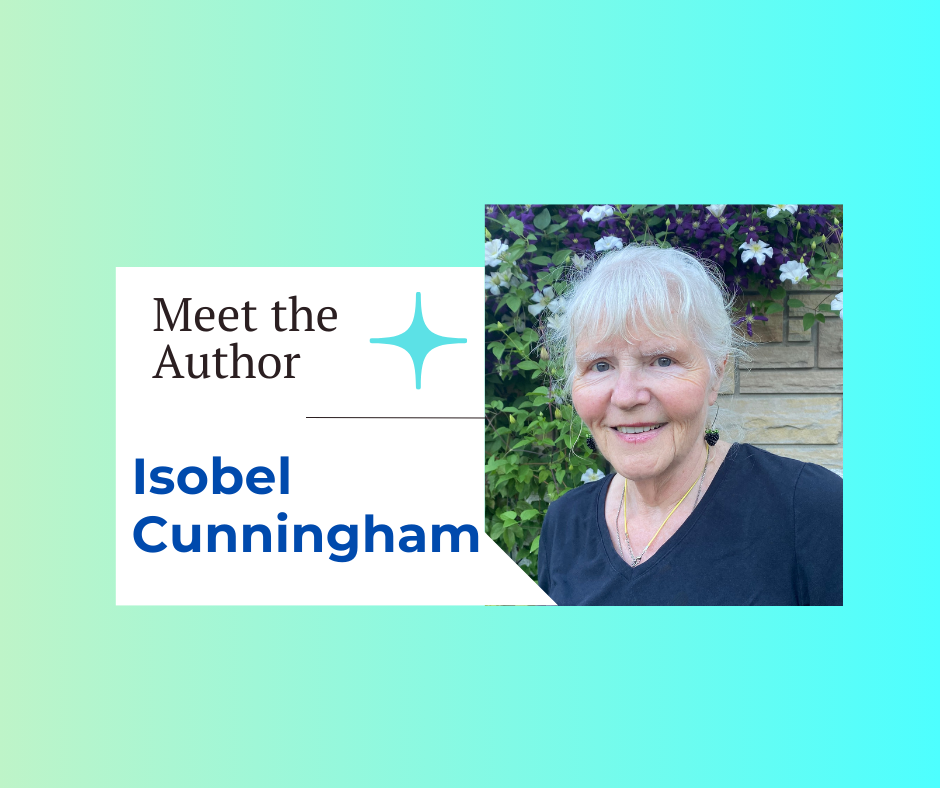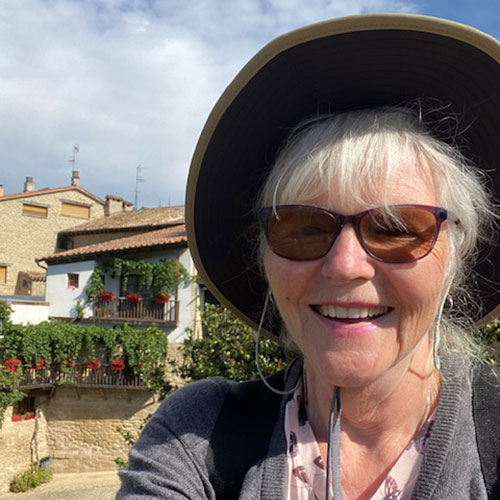Meet the Author: Isobel Cunningham

We’re thrilled to introduce another new author! Join us in welcoming Isobel Cunningham to the Type Eighteen Books fold. She’s an accomplished writer of fiction, poetry, and nonfiction, and we’ll tell you soon about the book we’ll be championing. For now, get to know our newest author a little.
About Isobel Cunningham:
Born in Wales where she learned to love the music of words, her home has been Montreal, Canada, for most of her life, on the unceded territory of the Kanien’keha:ka (Mohawk) nation. A degree in education gave her the freedom to take sabbaticals from her hospital social work career and travel to Greece, Poland, and the Canadian Arctic.
Besides several online publishers, her stories, poetry, flash fiction and nonfiction have appeared in respected U.S., Canadian, and British print anthologies. She has been nominated for the Journey Prize, offered by McClelland and Steward Publishing for a short story originally featured by Agnes and True Literary Magazine. In 2021, she was one of the five writers in residence for the Canadian Broadcasting Corporation/Quebec Writers’ Federation. Other nonfiction work appeared in February 2024, on the “First Person” page of the CBC. That piece resulted in an invitation to join the host of a popular call-in radio show in Montreal.
She is a story-spinning granny who loves long-distance hikes like the Camino in Spain. These adventures help her to live close to nature and to fill up her notebook. She often visits her daughter on Vancouver Island, where a Rocky Mountain glacier inspires driftwood beach walks. English is her mother tongue, and she is fluent in French and Modern Greek. She is working on her Spanish, too, as she believes languages are a prism for us to examine facets of reality.
And here are some questions from us:

Who are some of your favorite authors, and why?
Charles Dickens for his color and imagination, his plotting, his courage in tackling unpopular social causes, and his impossible over-the-top characters. I feel a kinship with his theatrics too. I am never happier than at the mike. The set of Dickens was one of the few items we brought as an immigrant family in the 1950’s from my maternal grandmother’s house. It sits on my bookshelf – seldom read now but treasured as works, some of which I read before I was twelve.
As a young child the Bible was read to me nightly as I shared a double bed with my Methodist grandmother. Out of the rustling pages came battles, adultery, giants, heartbroken King David, a queen thrown from a window to be torn to pieces by dogs, and very little in the way of New Testament love and mercy. That was left to my Roman Catholic education. Later, I came to Orthodox Christianity with its careful treatment of images, which are considered to be “written” not painted.
I have enjoyed historical fiction by Ken Follet and Phillippa Gregory with her skill in presenting a believable character in a deep historical setting. Some of my modern favorites are Annie Proulx, Orhan Pamuk, and a Canadian author, Anna Dowdall. In non-fiction I like Marcus Aurelius and historical non fiction that helps me understand what and how events played out. I am presently reading Spain in our Hearts, about Americans in the Spanish Civil War, by Adam Hochschild.
When did you know you were a writer?
I first really believed I was a writer while attending a Writers’ Conference in San Miguel de Allende in Mexico. I went three times (2014, 2015, 2016) and finally a wonderful poetry teacher, Judyth Hill, encouraged me to self-publish a poetry book, “because your work needs to be out in the world.” I started submitting to literary magazines after that. As I craft short stories or longer work I “mine” my own experiences so that tragedy, joy, fear, and even boredom can be raw materials to be woven into stories and poems.
Where were you born? Do you think the places of our lives inform our writing?
My early years in Wales were full of singing and “telling the tale.” Perhaps too much Irish and English blood watered down the ability to sing really well, but choir is still one of my great joys. To write is to get down on paper what story “tellers” spin to entrance the listeners. It is quite a task to substitute the gesture, the timbre of voice, the whisper, eye contact, the pause, the very breath and to keep that spell over the reader. The familiarity with poets like Dylan Thomas, actors like Richard Burton, the notion of “hwyl” a Welsh word meaning fervor, enthusiasm, passion particularly in preaching or oratory had an influence I am sure, even though we were an English-speaking family living in the industrial South. I certainly think home environment, including first language, even first accent, are important in the formation of a writer. Learning other languages in my youth (French and Modern Greek) helped me see through those prisms of expression.
For most of my adult life I was a hospital social worker, later earning another degree in Teaching of English as a second language. My first profession demanded listening with empathy to people in crisis and understanding various levels of meaning in their stories. It also meant working on solutions that “fit” my clients. The second involved loving my native language enough to accept its beauty and craziness and to help others to master it.
Where would you vacation—city, country, beach, or mountains?
I discovered the Camino de Santiago in Spain when I was ’73, and I have walked three different routes. This, my passion of old age, has led me to be physically active, learn a new language (Spanish), and host in a pilgrim inn three times. I love visiting my daughter on Vancouver Island, too, where mountains and beach settings are such a joy.
What do you think is the most important part of storytelling?
I think that might be allowing the reader to take part in the story with his or her imagination. That means, the writer can’t be boring. Just as a teacher in the classroom has to help the student “get it” by themselves, so too the writer has to give the reader every opportunity to live the story themselves. For that reason, even if we mine our own experiences, we’ve got to change things, imagine something new, give birth to a captivating setting, an intriguing or sympathetic character. Plot, setting and character are the building blocks but the mortar is the time, the space we give the reader to fit it all together.
Check out Isobel’s blog at https://isobelmtl.com/
